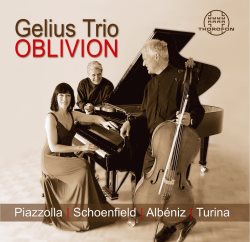|

|
Oblivion
Paul SCHOENFIELD (b.1974)
Café Music (1987) [15:33]
Astor PIAZZOLLA (1921-1992)
Die vier Jahreszeiten in Buenos Aires (arr. Jose Bragato) [24:29]
Oblivion (arr. Jose Bragato) [3:47]
La Muerte del Angel (arr. Jose Bragato) [3:30]
Joaquin TURINA (1882-1949)
Circulo (1942) [9:59]
Isaac ALBENIZ (1860-1909)
Tango, op. 165 Nr. 2 (arr. Werner Thomas Mifune) [2:21]
Astor PIAZZOLLA
Libertango (arr. Uwe Rossler) [2:55]
Gelius Trio (Sreten Krstic (violin), Michael Hell (cello), Micaela Gelius (piano))
rec. 23, 25 Feb, 11 Nov 2013, Tonstudio Auris Aurea, Munich.
THOROFON CTH2610 [63:40]
Here is a work sprinkled with an elephant’s serving of fairy dust. Listening to the Gelius Trio’s performance of the already sugary Café Music by Paul Schoenfield is like getting through your third helping of strawberry blancmange and jelly. It gets in a wobbly in the third movement, but other than this sugar-plum-fairy stomping waddle, the piece is insubstantial twaddle.
Schoenfield stated that it was his intention to ‘write a kind of high-class dinner music which could be played at a restaurant but might also find its way into the concert hall’. Indeed, the piece itself was inspired by Schoenfield’s time as house pianist for Murphy’s Steakhouse in Minneapolis, Minnesota. However, this trifling piece seems more befitting to accompany a bouncy-castle party than anything which requires repose and restraint. I fear that it would serve to unsettle — either with its insufferable buoyancy or irritating jollity — the more sophisticated diners and infuriate the music aficionados at the concert hall. On a more serious note, the classical framework to which this jazzy piece is pinned makes the overall sound contrived and too carefully constructed. Bluesy melodies and klezmer rhythms are diluted in this careful performance of something which needs to be unshackled from its tiresome constraints. Spontaneity is removed and replaced with a rather monotonous 1950s jive. It is undeniable that the Gelius Trio are talented and capable and their skill as an ensemble is felt in the subsequent compositions on this CD. If there is one overarching drawback to this recording, it would be that the performers do not always delve deeply, instead, seeing to skirt prettily around the edges.
Astor Piazzolla, an Argentinean bandoneon player and composer is known for his frivolous and feisty music, as well as for more heartfelt outpourings. In Die vier Jahreszeiten in Buenos Aires Michael Hell gives Piazzolla’s autumnal mists a shadowy hue, whilst Sreten Krstic’s glissando speckles the rolling, hazy musical landscape with lightning flashes and a spring sun. Unfortunately, Invierno sounds like a cross between sentimental salon music and Strauss’s ‘wine, women and song’. Needing a gypsy feel and fearless tenacity, but receiving only lukewarm attention, in parts Piazzolla’s reputation as ‘the world’s foremost composer of tango music’ (Stephen Holden) is in doubt. Michael Hell manages to play with enough restraint and control to maximise the tenderness and sorrow of Oblivion. A recurring theme and a frustration for the listener is that in the more sprightly passages the Gelius sound crisp and spiced with a sense of vitality, however, when the piece dips its toe into deeper, more melancholic waters, the players seem to melt away and sound almost too polished for such exciting compositions as La Muerte del Angel. For an earthy, seductive and spirited recording of Piazzolla I recommend Tango Nuevo recorded by the Gryphon Trio in 2008 (Analekta).
Mixing Andalusian and impressionist themes, Spanish composer Joaquin Turina retains a sense of rustic folksong and blends this with the styles that influenced him by composers such as Ravel and Debussy. Just as a reader may walk through a day in the life of Leopold Bloom in James Joyce’s Ulysses, in Turina’s Circulo the listener wakes, wanders and wanes with the music as its guiding signifier. Completed just before the outbreak of the Spanish Civil War, Turina’s composition defies the presence of menace with its persistent elegiac mood. However, Micaela Gelius is a little plodding and cumbersome. Both the Damocles Trio and Trio Arbos have made excellent recordings of this piece.
Werner Thomas Mifune’s arrangement of Isaac Albeniz’s Tango from his Suite España sounds fussy and pretty and does not evoke Albeniz’s sense of Spain. Albeniz said that in his music he wanted to evoke ‘the Arabic Granada, that which is art, which is all that seems to me beauty and emotion.’ However, in this performance there are no heady scents of jasmines or click of castanets. When playing this CD, the listener yearns to get closer to Albeniz’s comments on his own music and to experience: ‘colour, sunlight, flavour of olives […] like the air, like the sun, like the blackbirds or like the nightingales of its [the Alhambra] gardens’.
When reviewing their recordings of Dvořák and Smetana, Jonathan Woolf expressed his wish that the trio would ‘relax more within a phrase’. These are sentiments which I share entirely. Ending with Piazzolla’s erotic Libertango, the Gelius demonstrate the percussive textures that can be created by their instruments and keep a steady tempo. Again one wishes that that their hair could be ruffled and the soles of their shoes scuffed for they remain too neat and orderly: more ballroom than tango.
Lucy Jeffery
 |
 |
|



 All Nimbus reviews
All Nimbus reviews








